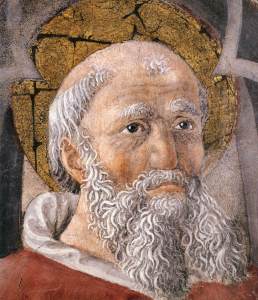St Ambrose on Mary’s Sinlessness (the Latin Text)

In seminary I wrote a paper that essentially divided the Fathers into two camps those that speak of Mary’s sinlessness in positive terms and those that speak of her sinlessness in negavtive terms. An example of a positive formulation would be that Mary was “All-Holy.” An example of a negative formulation would be that she is “without stain.” The former describes Our Lady by ascribing an abundance of grace. The latter by ascribing the lacking of something sinful. The following is from a section on St Ambrose.
Ambrose of Milan, wrote in the fourth century that Mary was not only physically inviolate, but also free from every stain of sin. The grace of God accomplished both her perpetual virginity and status as sinless.
Mary, a Virgin not only incorrupt [incorrupta], but a Virgin whom grace has made inviolate, free from every stain of sin [per gratiam ab omnia incorrupta labe peccati].
This is the first Latin articulation of what became the common assumption of the Western Church – that Mary is without stain [incorrupta] of sin. Ambrose does not speak of a generic stain but of “every stain” [omnia incorrupta]. It is also worth noting that Ambrose does not use the term macula, but incorrupta. The former is more properly a stain or blemish. The latter is obviously related to incorruptio, denoting an absence of rottenness. The Latin incorrupta corresponds to the Greek aphtharton. This can be observed in the Vulgate translation of 1 Corinthians 9:25 where aphtharton is translated as incorrupta, in the sense of the imperishable crown that awaits the saints of God.
Ambrose provides the fundamental negative statement concerning Mary’s moral status for the West. She is holy because she was preserved per gratiam from omnia incorrupta peccati. Mary is perceived in terms of what she does not have, i.e. every stain/corruption of sin. For Ambrose, sin indicates the inherited blemish of Adam and Eve’s rebellion. The inherited immaculist doctrine of the Latin Church belongs primarily to Ambrose and not to Augustine, as demonstrated below [i.e. in the rest of my paper on the subject].
What to Watch Next
SHOP THE TAYLOR MARSHALL STORE
Dive Deeper

GET CONFIDENT IN YOUR FAITH
Explore the fascinating world of Catholic teachings with Dr. Marshall. Together you’ll unpack the brilliant answers the Church gives to tough questions about the Faith. The best part: you go at your own pace. Start this exciting journey today.


 >
>


